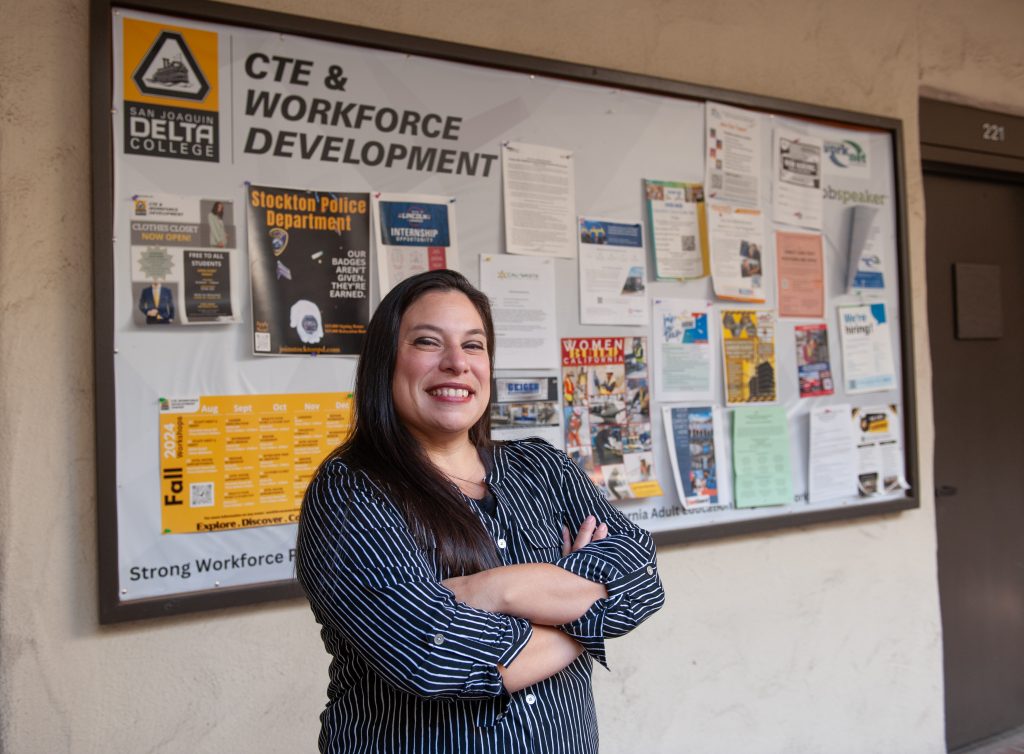Delta College works to fill workforce development needs in San Joaquin County

Michelle Castanon manages the Workforce Development Center at San Joaquin Delta College, where students can learn about a wide range of career paths. Photo by Bea Ahbeck
The San Joaquin Adult Education Consortium (SJAEC) and San Joaquin Delta College are taking important steps to ensure the students can not only afford an education, but also transition to the workforce with the help of the San Joaquin County WorkNet and DARTE (Directing Adults on the Right TrAC for Employment).
WorkNet is a service which provides employment and training opportunities for those looking for work in the county. Dr. Heather Maloy, the program manager for the (SJAEC), says the service is integrated into a student’s first weeks with the program.
“They’re introduced to a WorkNet case manager and all the support services they offer,” Maloy says. “Then the DARTE program comes in and that’s when they do the application workshop to Delta College.”
“When people think of CTE, they do think of vocational programs, the welding, the electrical, the machine shop. However, they don’t realize that there are non-traditional roles in that aspect.”
Michelle Castanon, CTE Program Manager, San Joaquin Delta College
The DARTE Program is an important part of San Joaquin Delta College’s partnerships with local adult schools through the consortium. This program allows students to complete transfer level English and math courses while they are in the process of completing their high school diplomas at the adult schools
“DARTE essentially was developed because when we were doing these transition-like activities there was nothing, no place for our students to really call a home base,” Maloy says. “So we provided this structure of the DARTE program where it’s this first year experience set of classes. They’re free, open educational resources.”
One student to make use of the program is Janet Cuevas Del Rio, who’s learned about the program while looking to both continue her education and find a part time job. She says the DARTE program was vital to her being able to accomplish these goals.
“I don’t know if I would have been able to do it without the program,” Del Rio says. “It was instant support. I needed a laptop? Boom, there it was. Internet? They worked to help me get it.”
Del Rio says the DARTE Program helped her find full-time work, as well as internship opportunities.
Maloy says that for students who are specifically looking for training programs, the school makes sure to connect them to WorkNet services. Maloy says one of the school’s goals is to make sure students are aware of these services when they’re making the transition from adult school to the college.
This effort towards workforce development isn’t limited to services like DARTE or WorkNet, either. Michelle Castanon, a career technical education (CTE) program manager for San Joaquin Delta College, estimates that 78% of the courses on campus are related to career training.
“They are certificate programs where students can finish anywhere between one semester leading to two years,” Castanon says. “A lot of them are going to be more of the short term, so that way they can get directly to work.”
Castanon also works as the manager for the campus’s Workforce Development Center, which she says has a focus on making sure students are able to get into well-paying, high-demand jobs. She says part of doing this successfully is making sure people knew the full breadth of opportunities available.
“When people think of CTE, they do think of vocational programs, the welding, the electrical, the machine shop,” Castanon says. “However, they don’t realize that there are non-traditional roles in that aspect.”
Some of these non-traditional roles include early childhood education, law enforcement and even stagecraft.
“These are where the students are really getting the opportunities for an education levels higher than a high school diploma, but that do not necessarily require a bachelor’s degree,” Castanon says.
Castanon notes that there are also specific areas where employees are more in demand than others. One gap she says they are focused on is logistics, industrial maintenance and manufacturing, or LIMM.
“They are becoming the new workforce at that entry level phase to be able to support the businesses that are coming through, especially with San Joaquin County,” Castanon says. “We have all of the facilities there that need some type of technically trained individuals to support them in that maintenance field.”
To learn more about how the San Joaquin Adult Education Consortium and San Joaquin Delta College can help you meet your job-training and educational goals, visit https://www.deltacollege.edu/campus-offices/instruction-and-planning/career-technical-education-and-workforce-development/dsaea
and sjadulted.org/.
Written by Jacob Peterson
| Regions | Classes & Topics |
|---|---|
| Central California | Variety of Classes – Workforce Development Board |